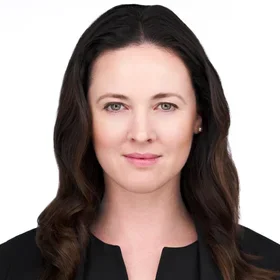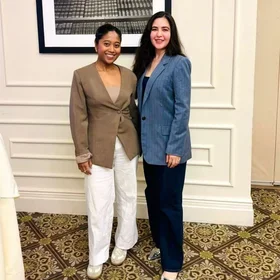Nicole Drepaul, ‘20SPS, found her calling in Negotiation and Conflict Resolution as a visiting student on an undergraduate ecological research trip with the Earth Institute of Columbia University to the Atlantic Rainforest in Brazil. While there, she noticed the discrepancy between legal application and enforcement of environmental conservation approaches.
“This conflict motivated me to push for environmental and legal change,” Drepaul says of the experience. “It was this journey that led me to explore negotiation and conflict resolution.”
Drepaul finished her M.S. in Negotiation and Conflict Resolution at the Columbia University School of Professional Studies this summer. Earlier this year, she was awarded a prestigious fellowship with the Coordinated Management of Meaning Institute, where she’s designed a worldwide project using CMM models and theories.
Tell us about your fellowship with the Coordinated Management of Meaning Institute.
My fellowship project stems from my graduate thesis, “Understanding How to Improve and Sustain International Peace Agreements: By Analyzing the Negotiation Discourse in Kashmir and Colombia Conflicts.” I wanted to further explore my graduate research and put it into practice.
In order to resolve international conflict, nations must be willing to invest in rebuilding a sustainable physical and mental infrastructure of human capital. I am focusing on how young people can learn to rewrite their own personal, historical, and cultural narratives in conflict-ridden areas. This project aims to eliminate generations of hatred and violence while pushing towards an understanding of the other party’s interests in order to reduce conflict.
What do you hope your project will achieve?
The final product of the fellowship will include a discussion with youth about the conflict. The facilitation of dialogue is meant to instill themes of understanding and acceptance of each party’s position with the hope of reducing tensions and depolarizing narratives. The topics that will be discussed relate to identity, religion, and culture.
The point of these conversations is to allow each party an opportunity to hear and understand the other’s viewpoint. The conversations are not meant to encourage participants to pass judgment by agreeing or disagreeing with others. It is crucial during these exercises to notice the participants’ rationale, as well as their emotions, such as fear, anxiety, empathy, and vulnerability.
Vulnerable victims can feel empowered by rewriting their own histories to show what they would change about the conflict... These conversations can spark generational change.”
Vulnerable victims can feel empowered by rewriting their own histories to show what they would change about the conflict. For example, did they triumph over the conflict’s obstacles or fail due to its adversity? These conversations can spark generational change and stimulate perspective giving and taking. It will teach the youth to accept the past while changing elements of the present to form a strong narrative for a better future.
Tell us about your experience in the Negotiation and Conflict Resolution program. What type of skills have you been able to build on through the program?
Due to the program, I have improved many of my strengths, namely mediation, negotiation, research, conflict analysis, writing, and reading, among others. These skills have sharpened my ability to analyze conflicts from alternative paradigms and models. The program has also allowed me to ramp up my communication to the next level. I learned how to tailor my actions and words to successfully ask for what I want.
What classes have been particularly helpful on your career journey?
There are several classes that helped me on my path, including Networking and Sustainability, Intrapersonal Dynamics, Intro to Negotiation, and Capstone Resolution Strategies. All of these courses enhanced my professional position as a Member of the Board of Advisors for African Youth Architects (AYA). AYA is a local NGO in Africa, which focuses on educational reform. In this position, I advise, design, and evaluate the organization’s programs and projects. These programs are focused on educational reform in regions such as The Gambia, Morocco, and Liberia.
My graduate courses aided my professional career in many ways. In particular, Networking and Sustainability taught me Results Based Management, Participatory Action Research, and Network Weaving. These specific approaches enabled me to bring together communities of volunteers and natives to work together to distribute resources effectively. It also taught me to devise a strategy to create sustainable change and to evaluate the performance of programs. Another course, Intrapersonal Dynamics, taught me to analyze my own strengths and weaknesses in order to negotiate and communicate more effectively.
What are some of the challenges you face in doing conflict work?
One challenge is having self-awareness of how my beliefs and understanding of the conflict can affect my research. Practicing self-awareness reveals underlying assumptions that are reflected in one’s writing, research, and inquiries. It also helps me learn to move at a slower pace when understanding other people’s emotions and perspectives, forcing me to sit and process them.
In order to resolve international conflict, nations must be willing to invest in rebuilding a sustainable physical and mental infrastructure of human capital.”
The NECR program has prepared me to handle these challenges in several ways. First, the program taught me to write down my assumptions and inherent beliefs before engaging in conflict analysis and research. Second, it led me through a process of self-discovery, where I learned more about my own characteristics and how they affect my conflict resolution skills. The program’s vast collection of library resources, as well as their grants, fellowships, and networks allowed me to engage in more research and to implement a method of analysis to determine solution competency to problems.
What advice would you give future students in the NECR program?
Ask questions and challenge the traditional fabric of old theories and beliefs. Students should take advantage of the faculty, research opportunities, and organizations of the School of Professional Studies, as well as the campus libraries. These resources allowed me to gain the most out of Columbia University’s vast network of knowledge, power, and ambition. I highly recommend incoming students network with fellow students, keep a balanced life, and enjoy every moment because it goes by too fast.
What are your plans for the future?
I hope to further my education with the completion of either a law school program or a Ph.D. program in political science. My research within the fields of political science, international relations, and global development can influence change in both professional and academic spheres, such as think tanks, non-governmental organizations, and congressional governmental divisions. I hope the culmination of my skills, knowledge, and research brings me closer to influencing societal growth and prosperity.
Learn more about the Master of Science in Negotiation & Conflict Resolution at the Columbia University School of Professional Studies.


